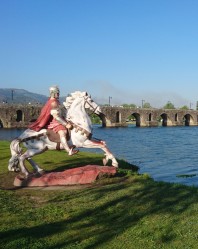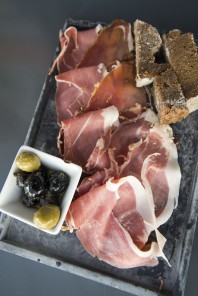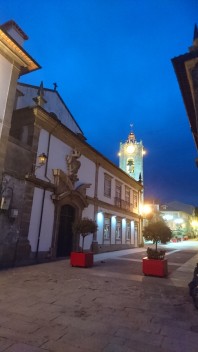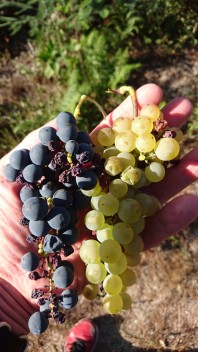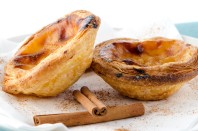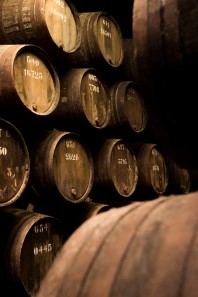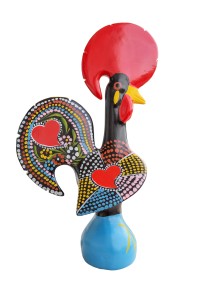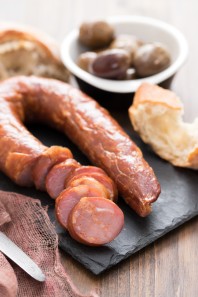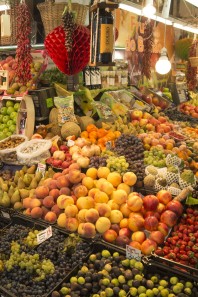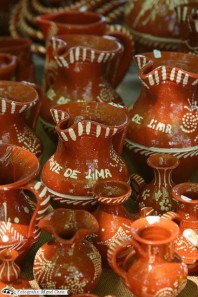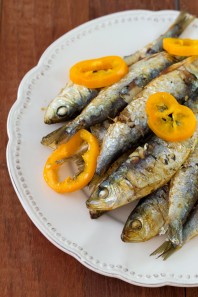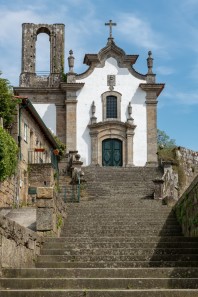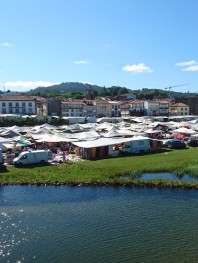History
Hominids have lived in the Iberian Peninsula for a very long time. The history of Portugal can be traced from circa 500,000 years ago when Homo heidelbergensis inhabited the region of present-day Portugal. This makes it one of Europe´s earliest places of settlement. Homo sapiens arrived in Portugal around 35,000 years ago.
The Romans invaded Portugal in 197 BC and ruled the country for almost 600 years. In 711, the Moors, North African Muslims, invaded Portugal and occupied especially the southern part of Portugal for many years. During the 1200th, trade with England intensified. 1386 was the Treaty of Windsor, a diplomatic alliance signed between Portugal and England. This alliance is still valid and states a pact of mutual support between the two countries.
Portugal has had the same defined borders since 1139, making it the oldest nation-state in Europe. Afonso Henriques was proclaimed the first King of Portugal in 1139, and the country remained a kingdom for almost 800 years. In 1910 Portugal was declared a republic after a revolt of military officers.
The University of Coimbra was established in 1290, making it one of the oldest universities on the European continent. Science and knowledge developed rapidly, and the country became a leading European nation increasingly.
In the fifteenth and sixteenth centuries, Portugal established the first global maritime empire, becoming one of the world's major economic, political, and military powers. Explorers like Vasco da Gama and Ferdinand Magellan discovered new areas on earth, and Portuguese colonies were established both in the west and east. The Portuguese Empire was the first global empire in history.
A military coup in 1926 installed a dictatorship under Salazar that remained until another coup in 1974. During this time, the Portuguese economy developed. After 1974 Portugal developed into a democracy that is a member of the EU. However, in 2000 Portugal turned into a deep financial crisis. Later the situation considerably improved thanks to actions taken by the government.
As a result of its exciting history, there are many interesting things to discover in Portugal. Old houses, castles and churches, Roman settlements, museums, and many historical places give many fascinating opportunities to explore and learn from one of Europe's most fascinating historical areas.
Festivals and events
Most villages and towns in Portugal have traditional festivals and pilgrimages celebrating Portuguese history, religion, and culture. Portuguese people, in general, are good at enjoying life, like celebrating, social events, and parties. Ponte de Lima is one of the most well-known towns for festivals and events. From April to September, something seems to happen almost every week. But even in the rest of the year, many events take place. This is probably a combination of tradition and a very active municipality.
Some of the most popular activities in Ponte de Lima are the Horse Fair and several horse competitions on the highest level, Corpus Christi when the streets of the town are covered with flowers, food, and wine festivals, Vaca das Cordas when a bull is running free in the streets of the city and finally Feiras Novas that is the season final in September when hundred thousands of people visit Ponte de Lima every year for a huge party.
The actual schedule of festivals and events in Ponte de Lima can be found on the official web page of the town. If not enough, you can find many more festivals and events in close cities like Porto, Braga, Guimaraes, Viena do Castelo and Barcelos.
Wines
Northern Portugal is very famous for some of the best wines in the world. Most people know about Port wines and Douro wines. Some people know about the fresh Vino Verde. But there are many more fantastic wines to explore.
Winemaking has a long history in Portugal. It was probably the Romans that started to grow wine in Portugal. During the 1200th century, trade with England intensified. Wine becomes at that time an essential part of Portuguese export.
In Portugal, wines are made in a very traditional way. When most other wine-producing countries standardized and focused on a limited number of “famous” grapes long ago, Portugal kept the old way of producing wine. Because of this, you can still find more than 300 different grapes used for wine production in Portugal. Many villages have their own unique grape. If you want to explore the history of wine, Portugal is today one of the few places you can find it in.
In the Minho region, where Ponte de Lima is situated, wine is produced in a very local way. Every village has a cooperative supporting local wine production with knowledge and technology. Traveling around, you can find various wines, taste them, and buy them in fantastic surroundings. Most known is the Vino Verde, the “green wine” that is found in many different styles and tastes.
Just south of the Mino region is the Douro valley situated. You are starting in the mountains and reaching the Atlantic Ocean in the beautiful city of Porto. The Douro valley is best known for the famous Port wines grown and produced here. Taylors, Sandeman, Grahams, and Churchills, result from British port wine houses being established in this region. You can taste Port wines in the wine houses in Porto, but we recommend you explore the valley itself. Either by car or by an organized boat tour along the Douro river. It is also possible to stay overnight at many of the wine houses along the river if you want to take your time to enjoy this fantastic area.
But the Douro valley is not “just” the Port wines. The Douro wines are today rated as some of the best wines in the world. Tasting red and white Douro wines with traditional Portuguese food is something you shouldn’t miss if you want to investigate the culture of Portugal.
Olive oil
Olive oil from Portugal has the highest quality. Portuguese olive oils are often found in the top in international olive oil competitions. Many experts rank olive oils produced in Portugal as some of the best. Still, most people don’t know much about this as Portuguese olive oil production is relatively small in volume compared to the big producers of olive oil from Italy and Spain. If you want to explore olive oils of the highest quality, Portugal is the place to visit.
Food
Food is an important part of Portuguese life. Portugal has an attractive traditional cuisine mostly made from locally produced ingredients. Around Ponte de Lima, there are numerous restaurants. Many of them are situated in historical buildings with a fascinating atmosphere. If you prefer international cuisine, there are also many such restaurants available.
Ceramics
Portugal has a long tradition in ceramics. Many plates, bowls, and mugs from different brands sold worldwide are manufactured in Portugal. Therefore, there are good opportunities to find and buy traditional Portuguese ceramics in shops and local markets.
Textails
Portugal has one of the strongest textile industries in Europe and is well-known for its craftsmanship and expertise in high-quality clothes and home textiles. Because of colonial influences in Brazil, Portugal’s cotton industry took form during the eighteenth century. By importing the necessary machinery from Britain, the Portuguese could outfit dozens of factories and set their economy in motion. As a result, today, you can find a different kinds of textiles of the highest quality in Portugal. Everything from traditional textiles to the latest fashion.
Art
In Portugal, you can find many kinds of interesting art. From classic painters to modern art. The municipality of Ponte de Lima arranges Art ´in Lima in the town during the entire summer. An art exhibition well worth a visit. For those who want to explore Portuguese art, we recommend stopping at the art museums in Porto.
Another side of Portuguese art is architecture. Two of the most famous architects in the world, Alvaro Siza Viera and Eduardo Souto de Moura, are from Portugal. Traveling around the country, you can find many beautiful buildings designed by them or visit museums and study their works.
Markets
In Ponte de Lima there is a big market every second Monday. The market has a long tradition as it is dated back to 1125. Here you can find many different things from food to clothes. Every second Sunday, there is an antique fair in Ponte de Lima where many interesting old things can be found cheaply. Several other markets are also available in the towns around Ponte de Lima. The market in Barcelos dates back to 1412 and is well worth a visit.
